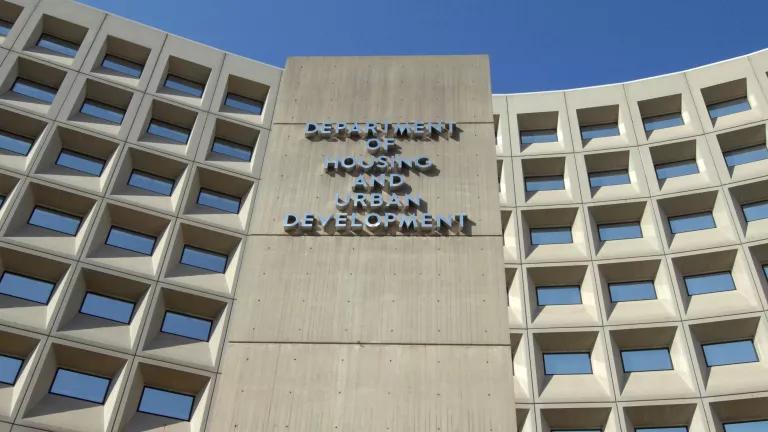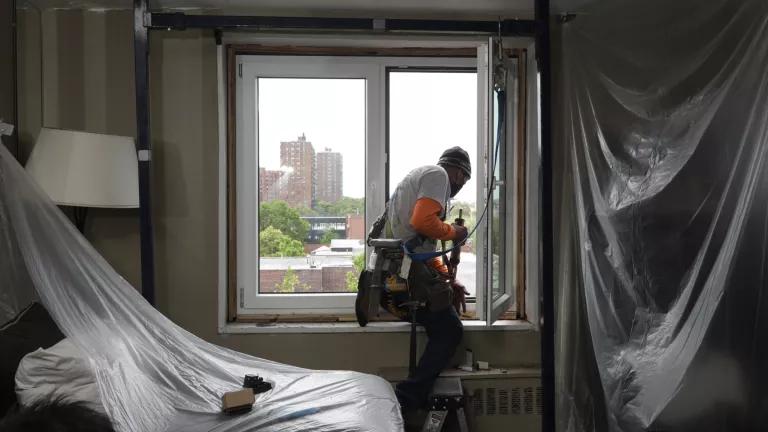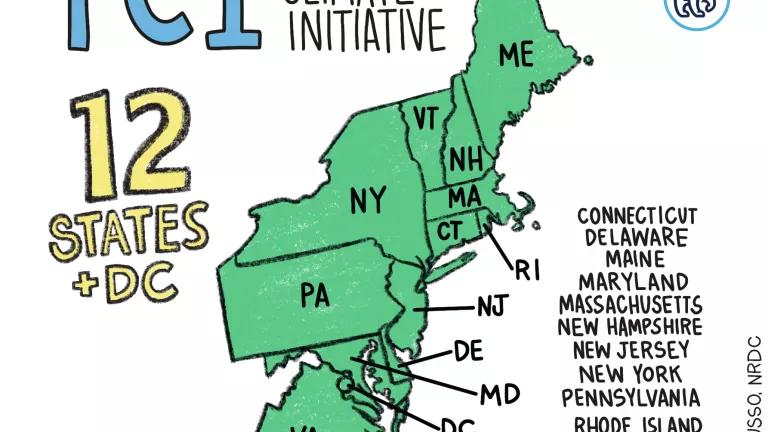How HUD Can Address the Crisis of Housing & Climate Change
The new administration and new leadership at HUD can offer a more coherent strategy toward ensuring stable housing and climate justice in America.

President Biden has made addressing the affordable housing crisis one of the key planks of his administration’s platform, offering a $640 billion, 10-year plan. That’s now coupled with the release of a $1.9 trillion legislative proposal that includes many elements necessary to enhance the lives of the nation’s low-income renters and ensure access to healthy, affordable housing. The U.S. Department of Housing and Urban Development (HUD) will have a critical role in ensuring successful implementation of the new president’s proposals.
Many of the provisions in Biden’s legislative proposal are a direct response to the acute needs generated by the COVID-19 pandemic. However, they also would deliver important, long-term improvements to critical housing and social safety net programs necessary to creating a more just response to the climate crisis.
Among the initiatives in the new relief proposal:
- An extension of the federal eviction moratorium through September 2021 with as many as 40 million people at continued risk of eviction;
- $30 billion in emergency rental and utility assistance;
- $1,400 stimulus checks for individuals earning under $75k per year;
- $5 billion to address the health and housing needs of people experiencing homelessness; and
- $5 billion for energy and water utility assistance, with millions of households months behind and few states with moratoriums still in effect.
Support from the new HUD leadership will be essential for making the new president’s vision a reality. President Biden surprised many by nominating Ohio Representative Marcia Fudge to lead HUD. While she does not have an extensive background in affordable housing policy or development for low income families, she brings a long track record of advocacy for social justice and civil rights. She should lean into those values as she seeks to implement Biden’s vision, which is based on the core value that housing is a right, not a privilege.
Representative Fudge must use her position to advocate for affordable housing and for HUD itself. America has an urgent national housing affordability crisis. Just 37 affordable and available homes exist for every 100 extremely low-income renter households. Despite this evident need, HUD resources and key programs—such as the National Housing Trust Fund, Community Development Block Grant Program, and Housing Choice Voucher (Section 8) Program—all remain critically underfunded and capitalized.
The COVID-19 pandemic is deepening the need, with as many as 40 million people still under threat of eviction and more than 8 million people plunging below a poverty line that already greatly undercounts the enormity of this crisis. The rise in frequency of climate-induced extreme weather events only increases the pressure on an already anemic federal housing infrastructure.
To execute the Biden Plan for investing in communities through housing, Representative Fudge should pursue a bold agenda to address rising housing insecurity and the affordability crisis, reaffirm the important role of housing in mitigating climate change, and respond to extreme weather events worsened by the climate crisis. One specific step she can take is leading HUD’s engagement in climate resilience with her fellow cabinet members in an interagency task force positioned to meet the full complexity of the challenges ahead and establish an Office of Climate Resilience within HUD.
A renewed commitment to housing as a human right
The Biden Plan for housing begins with a commitment to fulfill the federal government’s responsibility to ensure housing is a human right. Meeting this challenge will require increasing federal support for key housing programs, including addressing the shortfall in funding for public housing.
Central to Biden’s housing plan is to increase federal budget allocations that support affordable housing. One key area is ensuring that Housing Choice Vouchers reach every eligible household and that building owners are held accountable for discrimination against voucher holders. In addition, increasing federal support for the National Housing Trust Fund (Biden’s plan proposes an increase of $20 billion and establishes a $100 billion Affordable Housing Fund to construct and upgrade affordable housing) and the Community Development Block Grant Program will be essential elements needed to fulfill the Biden housing agenda. The CDBG program has seen an 80-percent decline in funding since its creation and it should be fully funded and restored to its initial authorization level. Established in the Housing and Community Development Act of 1974, the CDBG programs “provide annual grants on a formula basis to states, cities, and counties to develop viable urban communities by providing decent housing and a suitable living environment, and by expanding economic opportunities, principally for low- and moderate-income persons.”
Representative Fudge must also address our nation’s housing policy’s role and legacy in fueling racial inequality and discrimination. Two specific steps she can take:
- Immediately reinstate and implement the Affirmatively Furthering Fair Housing Rule, and
- Create a new Homeowner and Tenant Bill of Rights with expanded protections specifically for renters.
Reducing greenhouse gases & lowering working families’ electricity bills
Housing represents a key element of Biden’s climate strategy, which calls for reducing the carbon footprint of the U.S. building stock 50 percent by 2035 by creating incentives for deep retrofits that combine appliance electrification, efficiency, and on-site clean power generation.
This strategy includes establishing a $10 billion fund to make homes more energy efficient, which will lower household energy bills, create jobs for workers in the trades in every state in the nation, and reduce our greenhouse gas emissions.
HUD should take on a much larger role in the provision of energy efficiency services for affordable housing, particularly multifamily housing as part of a national climate mitigation strategy. If confirmed, Rep Fudge should create at HUD a fully functioning affordable housing retrofit grant program. This program would offer grants or loans to be used for energy efficiency upgrades, health and safety measures, electrification, and solar panels in affordable housing with a specific focus on multifamily housing.
Reducing harm and eliminating extreme weather threats to housing
Rapid extreme weather events along with the slower but steady paced rise in sea levels threaten affordable housing and the stability of many families and communities.
In 2020 alone, as Vox reported:
- “California experienced its worst fire season on record in terms of area burned, as well as its largest single wildfire on record. Colorado also had its largest wildfire in history, and blazes in Washington and Oregon created an unprecedented disaster.
- “The Atlantic Ocean experienced its most active hurricane season on record, with 30 named storms as the season closed in November and a total aggregated property damage expected to exceed $41 billion; threatening the lives and livelihoods of millions already in or on the brink of poverty.
- “A powerful storm known as a derecho swept through South Dakota, Nebraska, Illinois, and Iowa in October and became the most costly thunderstorm in US history, causing an estimated $7.5 billion in damages.”
As the shocks and disruptions from extreme weather increase, HUD must be ready to meet the challenge with adequate funding and resources. To ensure HUD’s leadership in responding to climate events, Representative Fudge should champion the permanent authorization of the Community Development Block Grant-Disaster Recovery (CDBG-DR) program. The CDBG-DR program “provides flexible grants to help cities, counties, and states to recover from Presidentially declared disasters, especially in low-income areas, subject to the availability of supplemental appropriations”.
COVID-19 has once again reminded us what we've long known: If you don't have housing and the ability to afford it, you are really vulnerable to lots of other things, including the growing threat of climate change. Simultaneously, housing has a critical role to play in the fight against climate change and must be seen as front and center to that effort. Meeting that challenge will require a clear departure from the recklessness of the previous administration in the way it neglected the housing crisis.
The new administration and new leadership at HUD can offer a more coherent strategy toward ensuring stable housing and climate justice in America. Let’s get to work.



